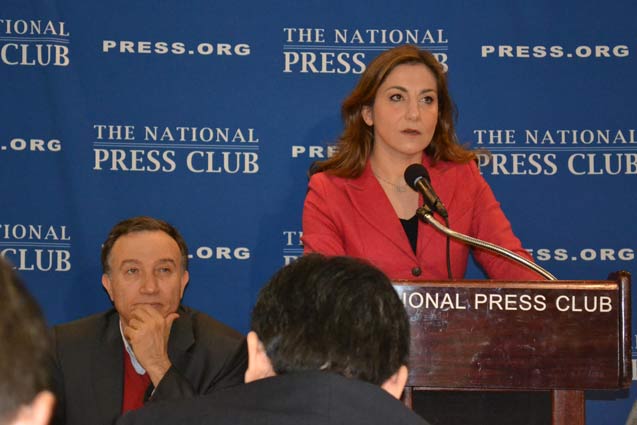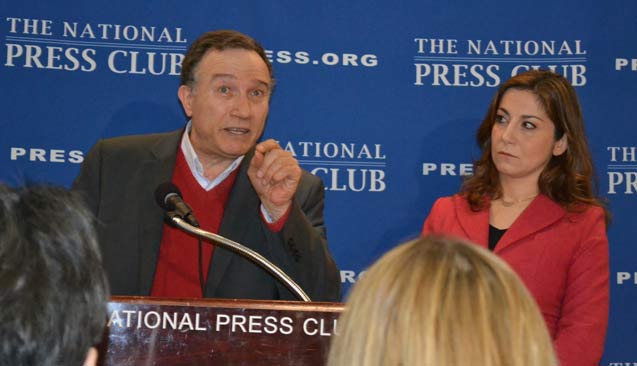
Representatives from a group of Syrian opposition activists pushing a political resolution to that country’s civil war visited Washington, DC, last week. Their perspective faces skepticism from influential quarters in Washington.
A group of Syrian opposition activists pushing a political resolution to the country’s civil war is facing skepticism from influential quarters in Washington.
The Syrian Civil Democratic Alliance, a confederation of political parties, was in Washington last week. It has been lobbying the United States and Russia to agree on encouraging factions to negotiate an end to the fighting without making Syrian President Bashar Al-Assad’s resignation a precondition. Representatives from the group claim to have spoken to staffers working for Sens. Ron Wyden, D-Oregon, and Mark Udall, D-Colorado, as well as State Department officials.
On March19, the spokespeople – Rim Turkmani, an astrophysics Ph.D based in London, and Haytham Manna, a longtime human rights activist living in Paris – characterized the meetings as constructive. “Generally speaking, the atmosphere was very positive,” said Turkmani, describing the State Department meeting. She later used the same term to describe her and Manna’s meeting with Senate staffers, saying that they found “a new logic” in the Alliance’s plan, which she summarized thus: “Despite all the arming, and all the confrontations on the ground, the determination of the conflict is not going to be through arms. It’s going to be through politics.”
Neither Wyden’s nor Udall’s office responded to requests for comments about the meeting and inquiries as to whether they took place. The State Department ignored similar inquiries.
On March 20, two days after the reported State Department meeting, Robert Ford, the US ambassador to Syria demonstrated skepticism concerning the ideas underpinning the group’s plan.
At the National Press Club in Washington, DC, Turkmani and Manna described their initiative as pragmatic and necessary, saying that Syrian society is rapidly deteriorating.
“I think that we must, in urgency, do our best for a negotiated solution and stop this absurdity,” Manna said. Turkmani said that epidemics are spreading, an entire generation is growing up without vaccinations and the country’s agricultural system has been devastated.
 Haytham Manna, a longtime human rights activist living in Paris and representative of the Syrian Civil Democratic Alliance addressed the National Press Club in Washington DC on March 20. (Photo: Sam Knight)
Haytham Manna, a longtime human rights activist living in Paris and representative of the Syrian Civil Democratic Alliance addressed the National Press Club in Washington DC on March 20. (Photo: Sam Knight)
The two said the violence has only produced a stalemate, that armed rebels have been promising an imminent victory for months, and that a military resolution will likely bring extremists to power.
If the United States and Russia can agree that negotiations should start without Assad having to step down, the pair contended, then the government will enter into talks, which, they hope, could lead to a secular post-Assad democracy.
“The stepping down of the president [should not be] a precondition to the start of the negotiations,” Turkmani said. “We want the departure of the president to be the result of the negotiation.”
She described the regime as “a naughty player, but it is a player and has a role to play.”
Turkmani also said that if the US and Russia agree that settlement negotiations can occur without preconditions, “there will be no way out for this regime.”
Manna added later that a policy of continued militarization would “really be the end of Syria, not the end of the regime.”
He said that the Syrian National Council – an opposition group receiving aid from the US government – contains a majority of Islamists, and described elements of the armed opposition as “criminals” engaging in “extremism.”
Turkmani added that an abrupt end to Assad’s regime could result in its loyalists destabilizing the transitional phase, and that the focus of the opposition should be on the power of the president, not his personality.
While Turkmani told Truthout that staffers for Sens. Wyden and Udall found their plan “very convincing” and “pragmatic,” and said that their meeting “with nine officials from the State Department” was “very positive,” the Obama administration appears to be moving in a different direction.
On March 20, at a House Foreign Services Committee hearing on the American response to the Syrian conflict, US Ambassador to Syria Robert Ford expressed skepticism about the Assad government actually being willing to negotiate, and distanced himself from the idea of encouraging an armistice.
In response to a question from Rep. David Ciccilline, D-Rhode Island, Ford said the US sees “a negotiated political deal as the best means to get a sustainable new government” and said that it has to be “in a sense, agreed upon by the different sides to the conflict.”
However, he added, “that does not mean we will ask the Supreme Military [Council] command,” – leaders of the Free Syrian Army – “to implement a cease-fire. But we would like to see negotiations.”
Ford also said he was “struck” by Assad’s offer “to send a delegation headed by the Syrian prime minister” to negotiate. He noted that Assad has previously stated that he would never leave Syria, but that fighting in Damascus is now “rattling his windows.”
“But I don’t know if that is serious,” he said. “And it has to be to discuss not a Bashar Al-Assad reform program, but rather the Geneva framework for a transition government in which Assad has no part.”
The framework, which was hashed out by delegations from the five permanent Security Council members and four Middle Eastern countries last June, has been interpreted in a variety of ways. It neither sets out a future for Assad in a post-conflict government nor insists that he step down.
Ford declined to take questions from the press after the hearing, which, like a Senate hearing on the humanitarian crisis held on March 19, featured no Syrian witnesses.
After the hearing wrapped up, Congresswoman Ileana Ros-Lehtinen, R-Florida, an influential House Republican and former chair of the House Foreign Affairs Committee, told Truthout that she “can’t see any scenario leaving Assad in power, even while negotiations are taking place” – comments that underscore the political difficulty of encouraging more discussions with Assad, despite pressing humanitarian concerns about the ongoing war.
Joshua Landis, director of the Center of Middle Eastern Studies at the University of Oklahoma and president of the Syrian Studies Association, said that American officials are “leery” about any sort of negotiations that involve Assad, considering Washington’s support for rebel forces.
The Obama administration has publicly stated that it is providing “nonlethal” aid to Syrian rebels. It denies arming the Free Syrian Army, although the Washington Post reported last May that arms shipments to the rebels are “coordinated in part by the United States, according to opposition activists and US and foreign officials.” And The New York Times chronicled the CIA’s involvement in arming the rebels in a March 25 report.
Landis described the Civil Democratic Alliance’s Manna as “a voice of reason,” even if he is “overly optimistic” about a negotiated settlement to the conflict.
“He’s been a very smart guy who has tried to find a mediated outcome so the country doesn’t destroy itself,” Landis told Truthout. “Very few people are going along with this reasoning. It doesn’t really matter that it’s reasonable.”
Landis noted that many people accuse Manna of working with the regime because of his optimism for a political settlement.
On March 19, Manna pointed out that a Civil Democratic Alliance member group that he helps coordinate – the National Coordination Committee for Democratic Change in Syria – has seen three of its executives jailed.
Only one of the other 25 executives lives outside the country, he said.
Turkmani said that the Alliance has based its assessment on this sort of domestic expertise – “a reading of the situation, driven from the ground.”
In response to a question from Truthout, she said that “it’s a pity” no Syrians were scheduled to testify at either the House hearing on March 20, or at a Senate Foreign Relations Committee hearing on the humanitarian crisis the previous morning.
She said it’s possible for Congress to reach out to Syrians inside the country, even now.
“The revolution opened a certain amount of freedom,” she commented, noting that Syrians can still be reached through Skype.
Turkmani also said that, perhaps, there is a lack of Syrian voices reflected in Congress because ex-pats haven’t been lobbying.
“There is a large group of Syrians in the US,” she said, “but we’re not used to this. We’ve never been engaged in lobbying.”
Trump is silencing political dissent. We appeal for your support.
Progressive nonprofits are the latest target caught in Trump’s crosshairs. With the aim of eliminating political opposition, Trump and his sycophants are working to curb government funding, constrain private foundations, and even cut tax-exempt status from organizations he dislikes.
We’re concerned, because Truthout is not immune to such bad-faith attacks.
We can only resist Trump’s attacks by cultivating a strong base of support. The right-wing mediasphere is funded comfortably by billionaire owners and venture capitalist philanthropists. At Truthout, we have you.
Truthout has launched a fundraiser, and we have only 24 hours left to raise $15,000. Please take a meaningful action in the fight against authoritarianism: make a one-time or monthly donation to Truthout. If you have the means, please dig deep.